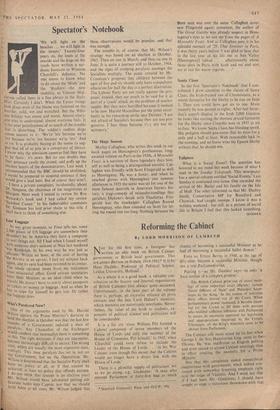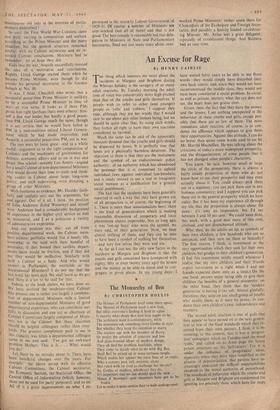Reforming the Cabinet
By LORD MORRISON OF LAMBETH
No-r for the first time, a foreigner has written an able book on British Cabinet government or British local government. This is.Cobinet Reform irt Britain, 1914-1963., It is.by' Hans Daalder,. Professor of Political Science, Leiden University, Holland.
As a whole it is a good book, a valuable con- tribution to the history and internal organisation of British Cabinets (not always quite.accurate). Unfortunately, in the later part of the volume there is, perhaps, an excessive reliance on press extracts and the late Lord Dalton's memoirs, which memoirs are notoriously unreliable:Never- theless, the value of the book to students, ex- ponents of political science-and politicianS will be considerable.
It is a far cry 'since William Pitt formed a Cabinet composed of seven members of the House of Lords and only one member of the House of Commons, Pitt hitnself,' to 1942. when `Churchill could even refuse to include the Leader of the House of Lords . . .:' in his War Cabinet, even though this meant that the Cabinet would no longer have a direct link with the House of Lords.'
There is a plentiful supply of politicians' wit as we go along; e.g., Gladstone: 'A man who ,eotered Parliament. at- forty-five had as much
— .
* Stanford University Press and O.U.P.. 45s. chance of becoming a successful Minister as he had of becoming a successful ballet dancer.'
Even so, Ernest Bevin, in .1940, at the age of fifty-nine, became a successful Minister, though not a real Parliamentarian.
Putting it---as Mr. Daaldcr says—in only 'a bare outline of a.complex process': The British Cabinet grew 'out of secret meet- ings of some important court, officials: certain 'Great Officers of State'. and 'Principal Secre- taries to. the King.' In the, course of centuries these offices moved out of the Court. When parliamentary power increased, it 'became essen- tial for the. Crown •to fill them with persons who wielded sufficient influence with Parliament to secure its necessary approval for legislation and appropriations requested by the Crown. Ultimately, all the King's ministers came to be chosen from Parliament.
The Cabinet still more stood on its feet when George 1, the'first Hanoverian king, came to the Throne. He 'was indifferent to English politics and soon ceased to attend Cabinet meetings. thus in effect creating the necessity. for a Prime Minister.'
Not that this completely ended monarchical interference with government, whch indeed con- tinued with somewhat lessening emphasis right into ,the reign of Victoria', And I -must say that if 4 had been Mr. Gladstone, 1 shOuld have sought to stage a victorious showdown with that
troublesome old lady in the interests of parlia- mentary democracy So until the First World War. Cabinets came and went, varying in composition and outlook according to the Prime Minister and the party situation; but the general structure remained similar, with no Cabinet secretariat and no re- corded Cabinet conclusions. Ministers had to remember: let us hope they did.
Even into the war, Asquith successfully resisted the idea of a secretariat and conclusions. Rightly, Lloyd George started them when he became Prime Minister, even though he did overdo his personal secretariat in the Garden Suburb at No. 10.
It was, "I think, Churchill who wrote that a successful peace-time Prime Minister is unlikely to be a successful Prime Minister in time of war—or vice versa. It looks as if three PMs prove him right (perhaps there were others): him- self a fine war leader but hardly a good peace- time PM, Lloyd George much the same, though it is not certain that he would have failed as PM in a non-coalition united Liberal Govern- ment which he had made impossible, and Asquith, a successful peace-time PM, not in war.
The two wars let loose great—and as a whole useful--argument as to the right composition of Cabinets and the machinery of government for defence, economic affairs and so on in war and Peace. One school—notably Leo Amery—argued for a Small Cabinet of non-departmental Ministers who would devote their time to study and think- ing; confer • in Cabinet about large, long-term policy; and each supervising, even directing, a group of other Ministers. With footnotes as evidence, Mr. Daalder faith- fully and usefully sets out the arguments, for and against. Out of it all, I think, the position of John Anderson (Lord Waverley) and myself wins. Anderson had a considerable background of experience in the higher civil service as well as ministerial, and I as a politician a variety of administrative experience.
And our position was this: cut off from Positive departmental work, the Cabinet mem- bers without portfolio would live a lonely life, somewhat in the void with their handful of assistants; if they bossed their satellite depart- ments there would be friction, and if they did not they would be ineffective. Similarly with such a Cabinet as a body. And who would answer to Parliament, the overlords or the departmental Ministers? I do not say that the last word has been said. We shall learn as we go; and there is a lot to be said for that.
Indeed, as the book shows, we have done so. We have evolved the moderate-sized Cabinet (the present one is rather too large); a combina- tion of departmental Ministers with a limited number of non-departmental Ministers of .good departmental experience, who can contribute use- fully to discussion and can act as chairmen of Cabinet Committees largely composed of Minis- ters not in the Cabinet. But these chairmen should be helpful colleagues rather than over- lords. The greatest compliment paid to me in this capacity was when a departmental colleague came to me and said : 'I've got an awkward problem Herbert. This is it. . . . What would You do?'
Let there be no mistake about it. There have been beneficial changes over the years. For example: the above set-up with its effective Cabinet. Committees, the Cabinet secretariat, the Economic Section, the Statistical Office, the Central Office of Information (which, however, must not be used for party purposes); and so on. All of it a great improvement on what I ex-
perienced in the minority labour Government of 1929-31. Of course, a nuMber of Ministers are over-worked (not all of them) and that is not good. The best remedy is reasonable but real dele- gation to Ministers of State and Parliamentary Secretaries. Shed not too many tears about over- worked Prime Ministers: rather spare them for Chancellors of the Exchequer and Foreign Secre- taries, and possibly a heavily loaded co-ordinat- ing Minister. Mr. Attlee was a great delegater, especially of troublesome things. And Baldwin had an easy time.



































 Previous page
Previous page